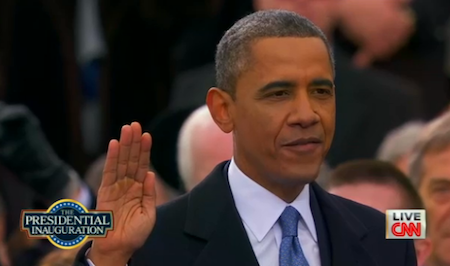
U.S. president Barack Obama was inaugurated today — on the celebration of Martin Luther King, Jr. Day here in the United States and with a touching invocation from Myrlie Evers-Williams, the widow of the slain Mississippi civil rights leader Medgar Evers on the 50th anniversary of his assassination — to somewhat less excitement than in the aftermath of his historic 2008 victory.
In line with that subdued spirit, Obama’s second inaugural address matched the rhythm of a presidency that’s now very much focused on achieving a handful of legislative accomplishments — a more stable budget deal with Congressional Republicans, immigration reform, gun control. Obama’s address notably and deliberately shouldered the responsibility to address global climate change. In many ways, it was a ballsy speech, and it had the cadence of a campaign address more than the flowery, if vapid, prose of typical inaugural addresses.
While Obama’s reelection, as I wrote a couple of months ago, will have real consequences for international affairs and world politics, his inaugural address did not prominently feature U.S. foreign policy, though it was impossible not to understand the weight of his declaration that “a decade of war is now ending.”
For me, the one sweeping passage on foreign policy was among the strongest of the entire speech:
We, the people, still believe that enduring security and lasting peace do not require perpetual war. Our brave men and women in uniform, tempered by the flames of battle, are unmatched in skill and courage. Our citizens, seared by the memory of those we have lost, know too well the price that is paid for liberty. The knowledge of their sacrifice will keep us forever vigilant against those who would do us harm. But we are also heirs to those who won the peace and not just the war, who turned sworn enemies into the surest of friends, and we must carry those lessons into this time as well.
Most notably, today’s address wasn’t broadly focused on foreign policy, in the same mould of, say, George W. Bush’s 2005 inaugural address, which outlined a broad and ambitious project for the spread of U.S.-style democracy to the Middle East — it’s worth recalling the sweeping prose from that address eight years ago:
We are led, by events and common sense, to one conclusion: The survival of liberty in our land increasingly depends on the success of liberty in other lands. The best hope for peace in our world is the expansion of freedom in all the world…. So it is the policy of the United States to seek and support the growth of democratic movements and institutions in every nation and culture, with the ultimate goal of ending tyranny in our world….
Bush’s address indicated that he was putting even longtime allies, such as Saudi Arabia on warning, as well as any country that failed to feature the hallmarks of liberal democracy.
Today, America speaks anew to the peoples of the world:
All who live in tyranny and hopelessness can know: the United States will not ignore your oppression, or excuse your oppressors. When you stand for your liberty, we will stand with you.
Democratic reformers facing repression, prison, or exile can know: America sees you for who you are: the future leaders of your free country.
Of course, Bush’s second term fell far below the ambitions of his first term — the quagmire of Iraq’s civil war, the continued fight in Afghanistan and Pakistan against a zombie Taliban effort, ongoing questions about torture and abuse of detainees by U.S. troops and their allies — all contributed to pull attention away from Bush’s cherished democratizing mission. Bush himself, as well as his ailing father, former U.S. president George H.W. Bush, did not attend today’s inauguration.
So today’s address, in what feels like a vastly different era, didn’t purport to signal a sweeping new doctrine to the world. But it stands, in many ways, as a clear refutation to the high-water mark of the Bush-era rhetoric about the role of the United States in the world.
![]()


